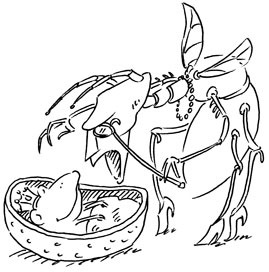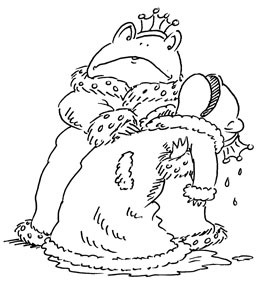Leaping Beauty: And Other Animal Fairy Tales
Read Leaping Beauty: And Other Animal Fairy Tales Online
Authors: Gregory Maguire,Chris L. Demarest


| Leaping Beauty: And Other Animal Fairy Tales | |
| Anthology [25] | |
| Gregory Maguire Chris L. Demarest | |
| HarperCollins (2004) | |
| Rating: | ★★★★☆ |
Grade 3-6–Eight well-known fairy tales are recast, with the aid of animal characters and outrageous puns (with some tongue-in-cheek witticisms thrown in), into such stories as "Little Red Robin Hood" and "Cinderelephant." In one of the most entertaining stories, "Rumplesnakeskin," a gorgeous and tough-talking sheep named Norma Jean changes her name to Beauty and ends up being forced to spin straw into gold to finance the king's latest failing movie venture. Demarest's madcap illustrations add energy and fun to a somewhat uneven collection. While kids will laugh out loud at the irrepressible youngest sibling in "The Three Little Penguins and the Big Bad Walrus," some of the selections, including "Leaping Beauty," seem labored and uninspired. However, fans of Dav Pilkey and Jon Scieszka will appreciate the zany situations and the joyful fracturing of traditional tales.
–Eva Mitnick, Los Angeles Public Library
Copyright © Reed Business Information, a division of Reed Elsevier Inc. All rights reserved.
Gr. 5-8. The author of numerous books for children as well as
Mirror, Mirror
(2003) and other adult fairy-tale adaptations tries his hand at parodying for kids in this collection of eight animal tales. In the title story a cursed tadpole becomes, successively, Weeping Beauty, Sleeping Beauty, and finally, Leaping Beauty. Most tales involve slightly skewed but satisfying endings: Goldifox, an unemployed carpenter, moves in with three chickens so that he can make them some comfortable furniture in "Goldifox and the Three Chickens." But a few include references that may be beyond the target audience: the miller's daughter, a blond sheep fond of tight sweaters, changes her name from Norma Jean to Beauty in anticipation of a movie career. Demarest's comical line drawings add humor to the droll text and highlight the tales' absurdities. More upbeat than Vivian Vande Velde's
Tales from the Brothers Grimm and the Sisters Weird
(1995) and more complex than Jon Scieszka's
The Stinky Cheese Man
(2002), this is a delightful collection, sure to be popular with sophisticated readers.
Kay Weisman
Copyright © American Library Association. All rights reserved
 Leaping Beauty
Leaping BeautyAnd Other Animal Fairy Tales
Gregory Maguire
This book is for
Luke, Alex, and Helen—
my own leaping beauties.
T
he king and queen of the frogs gave birth to a baby. They were delighted, for they had long wanted a child. The tadpole was as green as the slime in a vernal pond, and the bumps on her skin had bumps of their own. The king and queen decided to call her Beauty, as she was the most beautiful thing they had ever seen.
When the time came to have a party to celebrate her birth, the royal parents invited all the fairies in the kingdom, including bumblebees, butterflies, and an airborne brotherhood of beetles.
The party started out swell. The bumblebees brought their bagpipes, the butterflies brought their banjos, and the beetles brought their bassoons. The queen frog set up the guests in a summerhouse so that their hootenanny music could carry across the pond. (You’d be surprised how much music is written for bagpipe, banjo, and bassoon trios.) The king frog kept a watch fondly over his little Beauty.
The bumblebees ate the biscuits, the butterflies ate the butter and bread, and the beetles ate the beets. The queen frog kept putting out more, for it was her fondest hope that the fairies would feel like bestowing precious gifts on her beloved, wide-smiled daughter.
When dinner was through, the music struck up again. Many of the fairies danced the hootchy-cootchy. As the lights began to dim and evening chill settled in the air, one by one the fairies stopped their dancing and playing and came forward to look lovingly upon the newborn frog.
“On behalf of the bumblebees, I have a gift,” said the boss of the bumblebees, chomping on his cigar. “We bees like to hum a lot. We love songs. So let this little cutie hum and sing songs whenever she likes. She will have a beautiful voice for all to hear and enjoy. Her
ribbit
will be as loud as a foghorn.”
“Thank you,” murmured the queen frog. “Thank you all, my darling bees.” The baron of the butterflies fluttered forward. “On behalf of all the butterflies, I should like to give her a gift,” he said. “I should like her to move with the grace of a butterfly. Her froggy progress through a pond shall be as moonlight through a glade.”
“Bravo,” chortled the king frog. “Dear butterflies—our unending thanks!” Just then there was a buzz at the end of the field. Who should come droning along but the wickedest fairy of the meadows—a huge, ancient hornet, with a stinger as long as a candy cane.
“Who invited
her
?” muttered the queen frog.
“Croaked if I know,” her husband muttered back. “Thinks she can just crash any party


she wants? I’ll give her a piece of my mind!” He opened his mouth and unrolled his long, sticky tongue, flexing it threateningly.
“Careful, my dear,” said his wife. “She
is
the most powerful fairy in the field. She stings you, you’ll be croaking the Last Big Croak. I suppose we ought to give her a piece of cake or something.” She put on her brightest face. “Well, look who’s here to grace our little party! Old Dame Hornet, what a surprise!”
“You rude things,” cried Old Dame Hornet in a rage. “You have a party and invite all these simpering bugs, and you forget to invite
me
? I’m rocking with fury! I’m rolling with rage!
I’ll give your daughter a little present to remember this insult by!” With a speed surprising for one so old and frail, Old Dame Hornet flung herself to the cradle and looked down into the face of the pretty little baby frog. “Before your first birthday,” she cried, “you shall bite down on a stray explosive from some stupid human engineering project, and you shall blow yourself to smithereens!” And she gave a fiendish cackle.
“Oh, anything but that!” shrieked the queen frog. She fell into a dead faint, which made a loud slapping noise in the water, like a belly flop.
But the bishop of the beetles, who had been sneaking a little extra nectar at the refreshment table, now came forward. “I haven’t given our gift to the little princess yet,” he said.
“On behalf of the beetles, I declare that you shan’t blow yourself up when you bite down on a stray explosive. You’ll just begin to cry, because it will hurt. You will wail, you will moan, you will splash yourself with tears. We will all call you Weeping Beauty. It will be dreadfully sad, but at least you’ll still be alive.”
“Curses!” shrieked the hornet. “Well, crying all the time, that’s pretty bad too. I liked the exploding frog idea better, but you can’t win them all. Ta ta, everybody. And next time,” she hissed, “
invite me to the party
.”
Recovering from her fit of vapors, the queen joined the king in saying good-bye to the bumblebees and butterflies and beetles. Then hired bedbugs came in to turn down the sheets so the king and queen could go to sleep. Worried to distraction, though, the frog parents couldn’t sleep.
“Our Beauty will have a voice,” said the king, trying to be consoling. “She’ll have grace in motion.”
“She’ll weep—that’s her fate!” said the queen, who began to weep herself, in sympathy.
The queen and king did their best to protect little Beauty. They watched over her night and day. Beauty seemed such a pretty little thing, gifted at singing and dancing. She was always happy. Everyone around her was cheered up by the crooning of her second contralto voice, by her impromptu tap dancing and soft-shoe routines.
But though show business was gratifying, Beauty longed to be alone from time to time.
She didn’t want always to be the solo act in frog society. She wanted a break.
So one evening a week or two later, Beauty slipped away through the grass when no one was looking. She had never paddled in the river by herself, and she enjoyed what she saw: the beetles in their holes, the bees in their trees, the butterflies fluttering by in the wind.
Then she saw a metal box drifting in the strong current in the middle of the river. It looked a little bit like an iron sandwich, with cables and cords trailing out of the middle like stringy bits of raw onion.
Beauty felt a powerful hunger. She swam over and took a huge bite.
Ow! It felt like a volcano in her mouth. It tasted like lava lasagna. It seared the roof of her tongue and made her teeth ache.
Naturally enough, Beauty began to cry. Huge tears formed in her eyes and rolled down her nose. She was only barely able to make it to the riverbank. She tried to call out for her mother and father, but all she could do was weep—loudly. Since her voice was strong from all that singing, her parents heard the racket, and they came hopping as quickly as their old quaking legs could propel them.
Now, her parents weren’t king and queen of the frogs for nothing. They were intelligent frogs. They picked up their ailing, flailing, wailing baby Beauty and brought her to the base of the oak tree where Old Dame Hornet had a little nest.
There, Beauty cried. Morning, noon, and night. Her parents took turns feeding her, but she cried even when she was being fed. She was noisy, and she got noisier with practice. She made a sound like a fire engine going past, going past, going past, but never going away.
Old Dame Hornet was furious. She flew out of her nest and came down to yell at the baby to shut up. “Can’t you rock that little pollywog to sleep or something?” she said.
“I’m afraid not,” said the king frog. “She’s crying so hard she can’t fall asleep.” Old Dame Hornet liked her little nest too much to move. She had fixed it up just right, with a picture of her first-grade teacher on the wall and a braided rug on the floor. So she flew off to see the bishop of the beetles. The bishop’s secretary saw her into the bishop’s study.